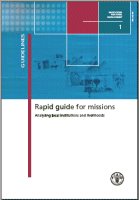Analysing local institutions and livelihoods

The Millennium Development Goals have once again focused world attention on the still illusive and daunting challenge of drastically reducing poverty and food insecurity. This means ensuring that some 600 million people – just half of those living in absolute poverty – can secure decent, stable livelihoods by 2015. We know that strong political will, adequate investment and a fair trading environment are crucial.
At the same time many, concrete efforts are being undertaken at the grass roots level by governments, civil society and international organizations to assist the poor to make a difference to their lives.
Why have these well-intentioned efforts so often failed to have the expected impact? A key reason is their technology focus that ignores rural realities: the heterogenity of rural households, their diverse livelihood strategies which change over time in response to new opportunities as well as the demands and constraints of different phases of their life cycles, their need to minimize risk to natural hazards and disasters, illness or death, fluctuating output prices and unreliable input supplies, and their attachment to cultural and social values that put human dignity and rights, empowerment and ownership of the development process as high on the agenda as material advancement.
This technology focus also ignores the crucial importance of local institutions such as farmers’ organizations, cooperatives, chambers of agriculture and political parties, through which rural people bring their needs to the attention of decision-makers, through dialogue or lobbying.
Local institutions are also the means by which the rural poor come together to develop and run economic enterprises, market their produce, and build and maintain infrastructure such as roads, bridges, and irrigation systems. Informal institutions of marriage, kinship and religion often provide the crucial means of organising reciprocal labour on each other’s fields at critical periods, assisting families caring for the sick or disabled or unable to work during bereavements, providing desperately needed food and other assistance in periods of floods, droughts, animal disease or earthquakes.
Many project design missions include rural sociologists or institutions specialists but so often their reports, usually based on participatory processes shared with the rural poor, are attached as annexes and their findings are not integrated into the project design. This indicates a lack of commitment to true inter-disciplinary work that brings all the different sectoral inputs into a coherent whole to provide a people-centred approach that effectively addresses the needs of the rural poor. This guide thus aims to stimulate such a people-centred approach among mission members who are not sociology or institutions specialists by providing some simple tools to help them better identify and appreciate different types of formal and informal local institutions that otherwise remain invisible to the non-specialist, and to incorporate into their project design a livelihoods perspective that is grounded in strengthened local institutions.
The guide does not claim to be comprehensive but rather a starting-point to assist mission members to gain a new perspective on development work with the very poor and to better ground their project design in reality.
Click here to view the document.








